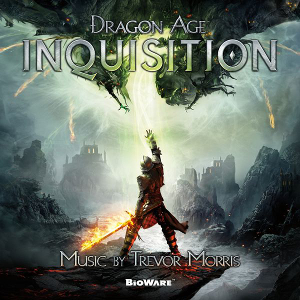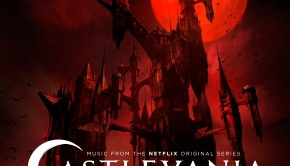Dragon Age -Inquisition- Original Soundtrack
 |
Album Title: Dragon Age -Inquisition- Original Soundtrack |
| Record Label: Electronic Arts |
|
| Catalog No.: N/A |
|
| Release Date: November 17, 2014 |
|
| Purchase: Download at iTunes |
Overview
Dragon Age: Inquisition, the latest installment in the popular fantasy gaming series, has been met with a lot of approval from both fans and newcomers to the game, particularly in comparison to the disappointing Dragon Age II. Prolific film composer Trevor Morris (Army of Two, Command & Conquer 3: Tiberium Wars) replaced Inon Zur, Bioware’s previous composer for the first two Dragon Age games, in hopes of bringing something new to the table. That said, I found myself with mixed reactions to the score. It is a solid and enjoyable one, featuring a respectable mix of thematic content and instrumentation, and several of the tracks were quite beautiful. But while it boasts plenty of large-scale fantasy tracks, there is not too much in this score that we haven’t heard before.
Body
The track opens with “Dragon Age Inquisition Theme,” which is a suitably epic opening. It is certainly grand, and utilizes some older musical techniques, including a slew of fifths as well as a Dorian minor mode to evoke the medieval setting of the game. The piece crescendos dramatically; while it begins softly, it quickly rises to become the sweeping epic track, through brass and strings of all octaves, that gamers and listeners alike expect to hear at the beginning of such a game. The production values of the theme are also quite impressive, with Trevor Morris seemingly blending instrumental performances with sampled parts as is typical for Remote Control Production scores these days. The theme returns several times throughout the soundtrack; in “Adamant Fortress,” it underlies a 6/8 rhythmic pattern through a male choir, and in “The Dawn Will Come,” an a cappella choir sings a gentle and straightforward rendition of the theme. The latter is my favorite setting of the theme, as it is subdued and thoughtful, and seems to really consider each note of the theme as being part of a worthy theme, instead of simply throwing on more instruments to make it even more widespread.
The score is chock-full of the larger-scale themes, however, featuring tons of big, heavy brass and percussion as well as low male vocals that serve more as rhythmic support than melody or even harmony. “The Lie in Which You Linger” is one such piece, opening with some darkly dissonant strings which gradually crescendo to a two-chord harmonic motif that Morris often brings into the score. The piece alternates between triplets and duplets as soli violins rise in a scalar pattern up to a larger melody. “Tooth and Scale” opens with higher-pitched dissonance, and pits shriekingly high-pitched strings and woodwinds against the lower percussion and strings to create a sense of rising tension and menace. The piece breaks about two-third of the way in to give way to triplet violins beating out a windswept, breathless pattern. These are the types of pieces that, while saturating the album and bringing a higher sense of drama urgency to in-game events, fail to add any real color to the score, or bring much originality to the world of epic games and movies. The tracks feel somewhat rote, and I find myself wishing for something for something a little more dynamic during action sequences or cutscenes.
“The Elder One Theme,” while in the same style as the previously mentioned pieces, is a more successfully executed track that works beautifully in context. It takes almost two minutes to slowly build up the strength in string, brass, and percussion to state its theme (the same two-chord motif as “The Lie in Which You Linger”), but the track does not end with that theme. As soon as it has repeated itself, staccato violins descend several octaves in short bursts, and a low alto melody slowly brings the piece back up. The melody itself doesn’t do much for the piece, but as it fades away, the short staccato bursts are back, and become intertwined with the lower melody. A rapid string pattern rises up as the bursts and melody are taking place, and suddenly the piece seems to be fully developed, but it fades away as suddenly as it began.
In actuality, what really piqued my interest with this score were the smaller tracks in which Morris utilized more unusual compositional techniques which gave the game its own identity far more than the main theme did. Just as the staccato bursts really gave “The Elder One Theme” its uniqueness, both “Lord Seeker” and “The Inquisition Marches” incorporated particular instrumentation that separated tracks from the rest of the score, which would otherwise come across as relatively commonplace. “The Inquisition Marches” is at first another variation of the main theme, this time in 9/8 time, but with a harp holding down a significant portion of the rhythm and meter, and a female vocalist joining the instrumentation of the melody. Alone, that kind of instrumentation is not particularly unusual, but the way in which Morris brings those instruments in gives them a new identity. Similarly, “Lord Seeker” brings in a plethora of percussion, from wooden clappers to strange, broken-metal sounds, to further break down a steady rhythm into more pronounced sub rhythms. It certainly reflects the more tribal elements of Inquisition‘s world.
I absolutely love the melody of “Val Royeux,” which takes the sounds of harpsichord and string quartet and layers them over a larger setting (only slightly larger). There is a female choir in the piece, but it’s hardly featured; instead, it accompanies the strings. The whole effect sounds like some jaunty tavern song or motet. I was disappointed that the piece was only a couple of minutes long, but the delightful melody returns in a few other settings, including “Orlais Theme, (the in-game country of which Val Royeux is the capital, which actually features a piano that serves as a kind of ornamentation – providing accented trills – to the piece.
A few of the pieces take on a completely different approach, such as “Journey to Skyhold,” which focuses far more on the upper octaves than other tracks of the score, at least in the first half. The violins belt out a generous melody that gracefully moves up the scale in fifths, following the pattern established by the opening track of the game. “Thedas Love Theme” is one of the closing tracks of the album (other than the bonus “Gameplay Trailer” track). The love theme, interestingly, features the main theme of the game but in a warmer setting, through copious strings and gentle ambient tones both holding down the chords as well as adding gentle notes of color supporting the various harmonies of the piece, alongside an extremely subtle piano. The resulting track sounds like one of Skyrim’s “atmospheres” by Jeremy Soule, but with a little more animation, and is exquisitely beautiful, as well as a breath of air after the somber, dark, dramatic music that makes up most of the score.
Summary
The soundtrack to Dragon Age: Inquisition is a good one, but not a great one. It has moments of splendor, but the unfortunate fact is that there is not much in the score that doesn’t also exist generically in most other fantasy scores. The parts that are distinguishable are fun to listen to, but are not quite substantial enough to hold the score on their own. The theme is used generously, and Morris does follow one of my cardinal rules of composition in terms of maxing out the theme as much as possible before moving on to anything else; the theme is a solid one, and Morris does his variations well. Those who enjoy sweeping, epic fantasy scores might enjoy Dragon Age as a decent addition to a substantial musical collection, while those who are more ambivalent might want to sit this one out, instead waiting for something better to rope them into the genre.
Do you agree with the review and score? Let us know in the comments below!
3
Posted on January 6, 2015 by Emily McMillan. Last modified on January 7, 2015.














